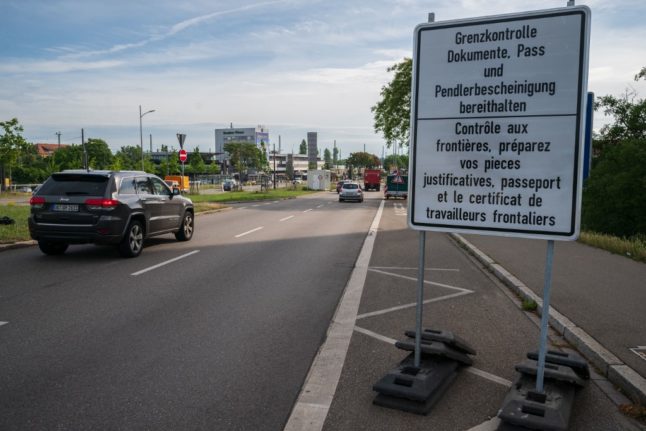Question: I’m British and I have residency in Italy, but my daughter and her family live in France. I like to spend a good part of the year with them in France, but since Brexit will the 90-day rule apply to me?
This is just one of many questions The Local has received on this topic – from British (and other non-EU) citizens who are permanent residents of an EU country, asking whether the 90-day rule applies to them.
Brits who were already living in an EU country before December 31st 2020 are covered by the Withdrawal Agreement, which gives them the right to stay in the countries where they live under many of the same terms as they enjoyed when they were EU citizens.
However, there are several things that the Withdrawal Agreement doesn’t cover.
One of those is moving to a different EU country, which UK nationals will now require a visa for – full details on that HERE.
The other is how much time they can spend in other EU countries.
90-day rule
In this case non-EU residents of EU countries are covered by the 90-day rule, in the same way as visitors from the UK or the US are. So in other words there is no different rule for those Britons who are resident in the EU.
You can read full details of how the 90-day rule works HERE but broadly, people covered by it can spend 90-days out of every 180 in an EU or Schengen zone country other than their own without the need for a visa.
The 90-day total applies to the whole EU/Schengen zone, so if you live in France you cannot spend 85 days in Germany and then go straight to the Netherlands for two weeks to enjoy the Eurovision Song Contest, as that would exceed your 90-day limit.
The 90-day limit is also intended for visits only, so if you intend to do paid work while in another EU country then you may need a visa.
Enforcement
Several people have also quite rightly asked us how this could possibly be enforced, given that passports are not routinely checked when travelling within the Schengen zone?
For example, how could French authorities really enforce the 90-day rule on someone who has crossed over from Italy for a lengthy visit?
While it seems unlikely people would be caught they should be aware that while residents of EU countries won’t be subject to the same passport checks and stamping as people entering the Bloc, that doesn’t mean there are no passport checks.
Controls can still be carried out at Schengen borders if, for example, there is a security alert or border restrictions are tightened due to the pandemic.
You could also be asked to produce your passport while visiting an EU country at a police or security check.
One thing to consider is that if you are found to have spent too long in a country where you do not have residency status or a visa you can face some severe penalties.
You may be fined in the country where you are found to have breached the 90-day rule and even deported. Your passport could also be flagged as an over-stayer which can cause problems for future travel or residency/visa applications.
In a worst case scenario non-EU nationals who stay longer than 90-days without a residence permit or visa could end up with a re-entry ban to the Schengen area.



 Please whitelist us to continue reading.
Please whitelist us to continue reading.
There are no borders so if you are driving within EU countries and are staying with friends or family how would the authorities know.
If you were driving from France to Italy for example, with French plates, who is going to know if you are British. If you have a French ID card, you could show that if asked.
Note that there are some work arounds for the 90/180 rule, at least for Australians and New Zealanders. In both these cases, there are bilateral agreements on visa waivers predating Schengen. For example, an Australian can spend 90 days in Germany (only Germany), then travel to a non Schengen country for a single day, then return to Germany for a new 90 day period (https://australien.diplo.de/au-en/service/01-visa/short-term-visa/2073662). This is entirely separate to the 90/180 requirement. I remember reading that a Kiwi managed to use these bilateral agreements to stay in Schengen countries for well over three years. However, seek confirmation from the relevant embassies before using these agreements- not unusual for the border officials to not have a clue
I am a dual passport holder, US/British, and also have permanent residency in the Netherlands (with the ID) where I have lived for years. I like to spend chunks of time in Spain, and am very curious how things are going to work, if there will be any change in passport control within the Schengen Zone and how they would monitor the 90 day rule when passports are not checked. For example, since I am already living with Schengen, my passports will never be stamped on arrival in the Netherlands, and I assume when I land in Spain from another Schengen country there is no change? I am aware they may randomly check, especially for British passport holders, but could I not switch off sometime with my US passport or simply show my residency card from the Netherlands if asked? A bit confused how things are going to work in practice, if anyone knows if there are any changed to passport control within Schengen, that would be helpful to know.
I got into a bit of trouble leaving Spain, a while back, as I was travelling on a NZ passport, but there had been no one to stamp it when I entered the EU (in France). It’ll be interesting to see how that plays out.